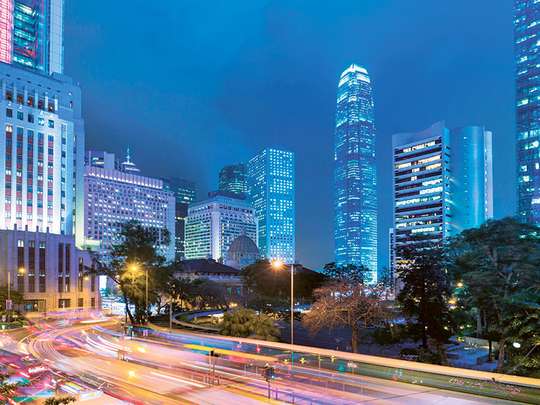
Hong Kong: As he scoured Europe to find parts last year, German entrepreneur Florian Simmendinger was only able to locate a handful of motors small enough for the wearable, smartphone-controlled metronome he was building to help musicians keep the beat — and even they were too weak.
But a move to Hong Kong in November jump-started the development of his product, as he was soon able to find everything he needed in the sprawling Chinese manufacturing hub of Shenzhen, just across the border.
“In Shenzhen, they sell every motor that has ever gone into a consumer product and I was able to get the one I needed, which is 600 per cent stronger than a mobile phone,” he says as he shows off his $99 Soundbrenner Pulse, which looks like a watch and emits vibrations rather than an intrusive tick-tock sound.
Simmendinger is one of a growing number of international entrepreneurs moving to Hong Kong to set up businesses focused on the “internet of things” (IoT), developing products that use the latest digital technology to enhance everyday items from headphones to electricity meters.
They are attracted by Hong Kong’s unique position, on the doorstep of a vast market and manufacturing base in mainland China but benefiting from a British-influenced legal system, straightforward regulations and low tax.
Cities and nations are racing to emulate the success of Silicon Valley and Hong Kong is particularly keen to promote its credentials as a tech hub because the economy is under pressure as tourism and luxury retail — traditional pillars of growth — have been hit by a drop in Chinese visitors caused by President Xi Jinping’s corruption crackdown and rising political tensions with Beijing.
“The government knows that we can’t continue to rely on financial services, retail and tourism,” says Allen Ma, chief executive of Hong Kong Science Park, one of two slick campuses built by the government to promote the technology industry in the early 2000s.
While the Science Park and its counterpart Cyberport have been in operation for over a decade, Hong Kong’s tech industry struggled to grow because of a lack of experienced venture capitalists, the small size of the domestic market (7 million people) and a risk-averse business culture.
But investors say that has started to change in the past year or two as entrepreneurs have realised that Hong Kong is well placed to capitalise on two fast-growing global sectors: the IoT and financial technology.
Hong Kong is still waiting for its first big success stories, but the number of co-working spaces targeting start-ups has jumped from three in 2010 to 40 today, according to InvestHK, the investment promotion agency.
Several of the largest co-working spaces are backed by established companies such as DBS, the Singaporean bank, and Swire, the Hong Kong conglomerate that controls the Cathay Pacific airline, and they also provide entrepreneurs with funding and advice.
David Lynch, head of technology for DBS in China and Hong Kong, says that Hong Kong’s position as one of the world’s leading financial centres makes it an ideal location for start-ups focused on banking technology in Asia and beyond.
“Banking as we know it is being unbundled, and unless we participate actively in this ecosystem, there’s a real chance that ourselves and other banks will be left behind,” he says.
When it comes to financial technology, Hong Kong start-ups are going head-to-head with rivals in other banking centres such as Singapore and London. But David Chen, who runs an investment group called AngelVest, says Hong Kong has a significant competitive advantage in developing IoT technology.
“For IoT, we see Hong Kong as much more advantageous than other places like Singapore because of its proximity to Shenzhen and the ease with which you can rapidly develop prototypes,” says Chen, who helped one of his invested companies, Hanson Robotics, move from Texas to Hong Kong’s Science Park.
Shenzhen, home to Chinese tech groups Tencent and Huawei, has a thriving start-up scene of its own but Isaac Mao, a Chinese entrepreneur, says Hong Kong is better suited to smaller companies that want to expand internationally.
“It’s much easier to start a business in Hong Kong, the intellectual property protection is much better and there are no internet restrictions as there are in the mainland,” says Mao, whose company Aivvy is developing headphones that incorporate an internet-connected music player.
“In Hong Kong, from the first day, you’re aiming not just for China but to spread to nearby regions, and that keeps people open-minded.”
— Financial Times












